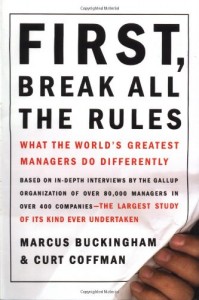Podcast: Play in new window | Download
Friends,

This week on my Everyday Leadership radio show we’ll hear from Curt Coffman, who with Marcus Buckingham co-authored the highly popular Gallup-data based book, First, Break All the Rules: What the World’s Greatest Managers Do Differently. They weren’t the first to say it, but said it best: when it comes to employee satisfaction and engagement, “managers trump companies.” They argue persuasively that you’re better off with a great manager in an average company, than with an average manager in a great company. To help build knowledge and learn what people think makes a good (or a vexing) boss, please take the 3-question survey; it will immediately give you results.
Introducing some great real managers. In the Habitat for Humanity First Family Build, forty five of my relatives came together over two weeks for a “family reunion with a purpose,” and we built a home from scratch. I was uplifted by the managers on the project. Jackie Frencher ran our construction project. I’m of a gender-and-generation that I confess to doing a double-take when I watch a twenty-some year old, African American woman instructing everyone on a building site, and when I see her wielding tools like the working class men in my neighborhood whose hands were greasy, strong, and a little gnarly. (They got some yucks out of my dad whose idea of using his hands was tying a necktie or bow tie.) On the work site, we all looked up to Jackie for her skills, but also for her calm and her wisdom. I watched her with admiration, not just for the amazing breadth of her knowledge but also for how she sought advice and listened to input. I love a boss confident enough to ask for help.
My “direct supervisor” was Renee, a real estate agent who spends every Wednesday and Saturday volunteering for Habitat. (The beautiful thing about volunteer work is you can usually pick your boss). I picked Renee because she had great tools (I mean her skills, as well as her overflowing toolbelt), and because she had an outrageous laugh, kindly aimed half the time at others and half the time at herself. Aren’t those further examples of self confidence in a leader?
Renee had two more skills I look for in a leader: tremendous competence at what she does, and the ability to continually empower others. She could do anything five times faster than most volunteers (and ten times faster than I), but she kept giving us instructions, and then slack to try. We could go back to her if we were confused or struggling. She’d give advice, but she never took the job back. I was a bit timid. After all, I hated the idea that Kenyota’s house would end up with mold or crooked siding on account of my botched workmanship. But with Renee’s patience we workers learned our jobs, climbed the learning curve (sometimes by redoing things we did wrong), and performed in a satisfactory way. By being given opportunities we learned both our limits – what we weren’t quite ready to take on – as well as our limitlessness, as we tried power tools, caulk guns, and drills that were at first intimidating.
I look forward to Curt Coffman’s wisdom. And I will look back to Renee’s: to wit: share my tools, believe in my team members, be ready to help, and keep laughing at myself! Do take two minutes to complete the survey to let us know what you think makes a great or a lousy boss.
Lead with your best self!
Dan

I took the survey, but cannot get the the survey monkey to recognize me so I can’t see the results. What’s up?
I too was willing to “take two minutes to complete the survey to let us know what you think makes a great or a lousy boss” to, at least I thought, help you. I spent more time and frustration trying to get to the results than taking the survey. I gave up and went back to my work. A little warning or instruction at the time of the request would have been helpful.
Turns out, it was somewhere between “confusing and deceptive.”
Managing, like leadership, is in a large part about creating a climate of respect and motivation rather than a climate of fear. So many people learn buzzwords about CQI and about ‘shaping the future’ but quickly fall back into their muscle memory of how to deal with those with whom they work. Once again, people who continue to do things the same way and to expect different results are lacking in a basic understanding about human behavior and feelings. Respect breeds respect. Motivation can lead to creativity and motivation. Change and improvement has to be based on looking at what has been, at what is, and at what you want to have happen. What are YOU willing to do differently to influence a different outcome. With a lousy economy and so many people in fear of losing their jobs and homes, there is even more importance in appreciating the good things people do and in making sure they understand and are excited about a clear mission. We are all in this together.
Be well.
Lead, manage, parent, encourage the shape of the world with your best self.
Philosophy is nice but action is essential.
-Jerry Leismer
Like Peter and Jan I completed survey but have not been able to get results and become frustrated with SurveyMonkey getting me to login and then not recognizing me.
Dan,
Wonderfully put. Of all the great experiences I had on the build, watching the skilled builders teach the rest of us with enviable patience and humor was the best! Great working with you as always.
Ann